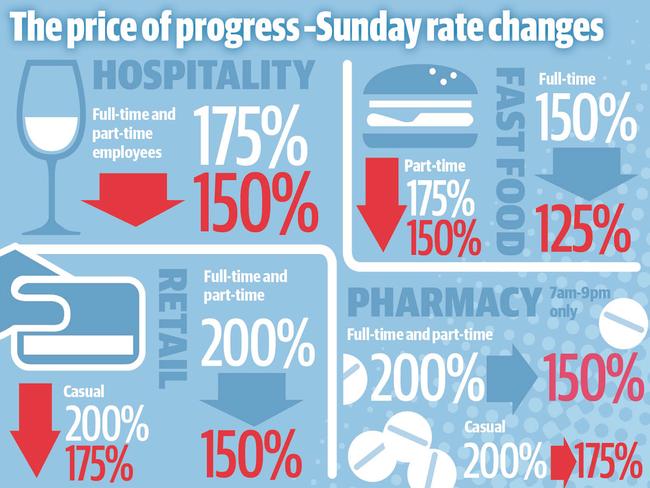Penalty rates reduction will allow longer hours and more hiring, employers say
NEARLY one million workers copped a pay cut, but yesterday’s penalty rates cut will make it cheaper for shops, cafes and restaurants to stay open longer and hire more staff, employers say.
NSW
Don't miss out on the headlines from NSW. Followed categories will be added to My News.
- Fair Work Commission cuts Sunday, public holiday penalty rates
- Penalty rates belong in era of horse and buggy
NEARLY one million workers copped a pay cut yesterday as the Fair Work Commission slashed Sunday penalty rates — a landmark ruling that employers praised as making it cheaper for shops, cafes and restaurants to stay open longer and hire more staff.
Retail staff will now be paid time-and-a-half instead of double time to work Sundays, while penalty rates for hospitality employees will drop from 175 per cent to 150 per cent.
The changes will be phased in from July 1.

Unions claim nearly one million workers will lose up to $6000 a year as a result of bringing Sunday penalty rates roughly in line with Saturday rates. But NSW Business Chamber chief executive Stephen Cartwright said bosses would use the savings to create more jobs.
“The adjustment in penalty rates for Sundays means your favourite local businesses are able to remain open and be fully staffed,’’ he said.
George Kanellos, owner of the Rose Hotel in Chippendale, welcomed the changes.
“As a business owner it means we can hire more staff and have more working on Sundays which works best for customers,” he said.
“Changes to penalty rates wasn’t something we were (pleading for) for but if it’s happening and working in our favour it’s good.
“We are on the way to seeing a whole class of working poor in this country.”
“We just spent a lot of money on renovations so anything will help.”
Nicole Bann-Murray, who owns the Peloton Espresso Bar in Port Macquarie, said high penalty rates forced her to close on Sundays but she could now afford to stay open all weekend.
Michael Newton-Brown, who owns the chain of Leisures Shoe Boutiques, said he opened with a skeleton staff on Sundays — but would now hire more workers.
“Someone will get extra hours, or we’ll be able to bring on an extra person in the middle of the day,” he said.
Australian Chamber of Commerce and Industry chief executive James Pearson said penalty rates meant small businesses “struggled’’ to trade on weekends.


“They’ve been given a green light to offer longer working hours, stay open longer, provide better service to customers and create more jobs,’’ he said.
The Australian Retailers Association said penalty rate cuts would shave 4 per cent to 5 per cent from retailers’ total wage bills.
Harvey Norman boss Gerry Harvey said he doubted he would hire more workers to work on Sunday because “even though the rate has come down it’s still very expensive”.
“It’s not going to make much difference,” Mr Harvey told The Daily Telegraph.
Australian Council of Trade Unions president Ged Kearney said workers would have to make up for the pay cuts by working longer hours or extra shifts.
“We are on the way to seeing a whole class of working poor in this country,” she said.
“For those to be going down for casual work by 25 per cent it’s not great, it kinds of hurts.”
“We do not accept that cutting people’s pay will have any positive benefit to their standard of living or the economy.”
National Union of Students president Sophie Johnston said the penalty rate cuts would put “massive stress and pressure” on university students who rely on weekend work.
“A lot of students are living out of home and trying to support themselves and they are already living below the poverty line,” she said.
University student Georgia Nash, 20, has planned her studies so she can work on weekends to get penalty rates at a Paddington fashion store and has concerns how the changes will affect her bank balance.
“For those to be going down for casual work by 25 per cent it’s not great, it kinds of hurts,” she said.

Ms Nash hopes she can pick up extra shifts on another day to ensure she has enough money. “It’s hard enough to get shifts as the store is quite small.”
Delivering the decision, FWC president Iain Ross said the wage cuts were “likely to have some positive employment effects”.
He said high penalty rates had led employers to restrict trading hours, minimise staff levels and reduce customer service.
“Reducing the public holiday penalty rate will increase employment and have a number of positive effects on business,” he said.
Justice Ross said most workers would “probably face reduced earnings” so “transitional arrangements” would be negotiated to stagger the cuts.
“Many of these employees earn just enough to cover weekly living expenses, saving money is difficult and unexpected expenses produce considerable financial distress,” Justice Ross said.
Opposition leader Bill Shorten — who initiated the FWC review of penalty rates during his time in government as minister for employment and workplace relations — deplored the cuts as a “kick in the guts” for workers.
“This is a race to the bottom,” he said. “Only Labor can be counted on to stand up for low-paid workers.”
But Prime Minister Malcolm Turnbull branded Mr Shorten a “hypocrite”, declaring that “he initiated it, he backed it, he owns it”.
“This is a decision of the independent umpire, not a decision of government,” Mr Turnbull said, adding that Mr Shorten “personally initiated the review into penalty rates (and) appointed the Fair Work umpire himself”.




